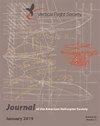Evaluation of Helicopter Ship Deck Landing Control Laws in Piloted Simulations
IF 1.4
4区 工程技术
Q2 ENGINEERING, AEROSPACE
引用次数: 0
Abstract
This paper describes the implementation and the evaluation of newly designed helicopter ship deck landing control modes in a piloted simulation study. The ship deck landing modes are embedded in a model-following controller architecture. The employed control design is a complete model-following control system, which imposes the desired command model dynamics on the controlled helicopter. Different command types combined with various hold functions are implemented to make the task easier for the pilots. Three basic command modes and three advanced command modes, one without ship communication and two with ship communication, are implemented. A piloted simulation study was performed in a simulator to evaluate and compare the implemented control modes within a complete maritime scenario design. The evaluation of control modes is based on the success of helicopter ship deck landings which is assessed by a quantitative as well as a qualitative assessment. Simulation results demonstrate that the advanced command modes improved the task performance as well as reduced the pilot workload extensively in comparison to the basic command modes.直升机舰船甲板着舰控制律在有人驾驶仿真中的评价
本文介绍了新设计的直升机舰甲板着陆控制模式的实现和评价。船舶甲板着陆模式嵌入在模型跟随控制器体系结构中。所采用的控制设计是一个完整的模型跟随控制系统,它对被控直升机施加所需的命令模型动力学。不同的命令类型与各种保持功能相结合,使飞行员更容易完成任务。实现了三种基本指挥模式和三种高级指挥模式,一种无舰通,两种有舰通。在模拟器中进行了试点模拟研究,以评估和比较在完整的海事场景设计中实现的控制模式。控制模式的评价以直升机舰甲板着陆的成功与否为基础,通过定量和定性两方面的评价来进行评价。仿真结果表明,与基本指挥模式相比,先进指挥模式大大提高了任务性能,减少了飞行员的工作量。
本文章由计算机程序翻译,如有差异,请以英文原文为准。
求助全文
约1分钟内获得全文
求助全文
来源期刊

Journal of the American Helicopter Society
工程技术-工程:宇航
CiteScore
4.10
自引率
33.30%
发文量
36
审稿时长
>12 weeks
期刊介绍:
The Journal of the American Helicopter Society is a peer-reviewed technical journal published quarterly (January, April, July and October) by AHS — The Vertical Flight Society. It is the world''s only scientific journal dedicated to vertical flight technology and is available in print and online.
The Journal publishes original technical papers dealing with theory and practice of vertical flight. The Journal seeks to foster the exchange of significant new ideas and information about helicopters and V/STOL aircraft. The scope of the Journal covers the full range of research, analysis, design, manufacturing, test, operations, and support. A constantly growing list of specialty areas is included within that scope. These range from the classical specialties like aerodynamic, dynamics and structures to more recent priorities such as acoustics, materials and signature reduction and to operational issues such as design criteria, safety and reliability. (Note: semi- and nontechnical articles of more general interest reporting current events or experiences should be sent to the VFS magazine
 求助内容:
求助内容: 应助结果提醒方式:
应助结果提醒方式:


